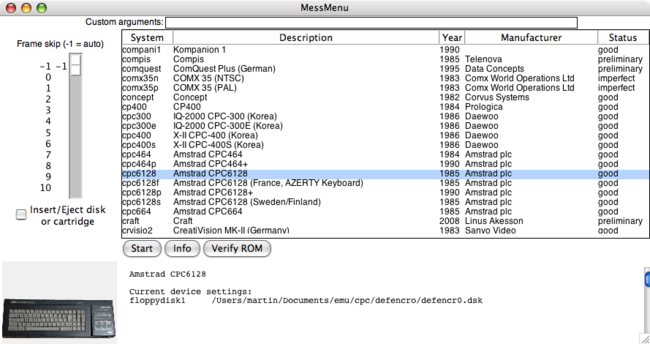Difference between revisions of "MAME"
(→Command line arguments) |
(→Other notable features) |
||
| Line 62: | Line 62: | ||
[[File:Messmenu.png|thumb|none|650px|MessMenu on OS X with a CPC ROM selected. Currently, seven different CPC models are supported, including some regional variants (French and Swedish).]] | [[File:Messmenu.png|thumb|none|650px|MessMenu on OS X with a CPC ROM selected. Currently, seven different CPC models are supported, including some regional variants (French and Swedish).]] | ||
| − | == | + | ==CRT simulation== |
| − | Like MAME, MESS can use | + | Like MAME, MESS can use shaders to simulate typical CRT graphics artifacts such as scanlines, colors bleeding into each other, jitter, and display curvature. |
| + | *Windows: German tutorial using the included HLSL shaders: [http://www.aep-emu.de/PNphpBB2-file-viewtopic-p-94168.html] | ||
| + | *Linux: MAME tutorial for GLSL shaders: [http://www.mameau.com/mame-glsl-shaders-setup/]. (Commandline and mess.ini option names are the same as in MAME.) | ||
==Links== | ==Links== | ||
Revision as of 09:54, 22 July 2013
MESS (Multi Emulator Super System) is an emulator for vintage computers, gaming consoles, chess computers, and calculators. It is a descendant of the MAME arcade emulation project and just like MAME, the most important goal of MESS is highly accurate emulation, not speed. MESS and MAME are mainly preservation projects that aim to reproduce the behavior of the real hardware perfectly.
Currently, over 450 systems are supported, including the CPC and CPC Plus ranges and the GX4000.[1] This is probably the main reason for using MESS, that a single download is enough to emulate more or less every home computer and gaming console that ever existed in the late 1970s and 1980s—provided one can find a ROM set that works (see below). MESS does not have the depth of other emulators, but it sure has enormous breadth.
MESS runs on Windows, Mac OS X, Linux, and FreeBSD.
Command line arguments
| Name | Argument | Allowed file extensions |
| Printer | -prin | .prn |
| Snapshot | -dump | .sna |
| Disk drive A | -flop1 | .dsk; .d77; .d88; .1dd; .dfi; .imd; .ipf; .mfi; .mfm |
| Disk drive B | -flop2 | |
| Tape | -cass | .wav; .cdt |
| Cartridge | -cart | .cpr; .bin (Plus series and GX4000 only) |
(info from sysinfo.dat)
Supported file types can also be shown with the "-listmedia" command line option.
You can use zipped disk images too. If there is more than one DSK image in the zip file, treat the zip file like a directory, e.g. "-flop1 disk.zip/disk0.dsk".
Keyboard options
MESS generally supports two keyboard mode command line options: emulated (the default; based on key position) and natural (command line option "-natural"; based on the character generated by a key, e.g. pressing "z" will always generate a "z" on the emulated system, even if the keyboard positions are different).
In emulated mode, keys can also be remapped from the emulator menu: first press Scroll Lock to enable the MESS control keys, then press Tab to open the menu, and finally select Input (this system).
ROMs
Just as in MAME, some MESS ROMs have parent ROMs that also need to be installed. E.g., cpc6128.zip also requires cpc464.zip to run.
ROMs often only work with a specific version of MESS. This does not seem to affect CPC ROMs, but other systems sometimes give an error message when ROM filenames or checksums do not match what MESS expected.
Front-ends
Various GUI front-ends for MESS exist for Windows, Linux, and OS X—see the list here: [2]
CRT simulation
Like MAME, MESS can use shaders to simulate typical CRT graphics artifacts such as scanlines, colors bleeding into each other, jitter, and display curvature.
- Windows: German tutorial using the included HLSL shaders: [3]
- Linux: MAME tutorial for GLSL shaders: [4]. (Commandline and mess.ini option names are the same as in MAME.)
Links
- MAME at the English-language Wikipedia
- Official site
- MESS user's manual
- CPC ROMs for MESS (look for cpc*.zip)

